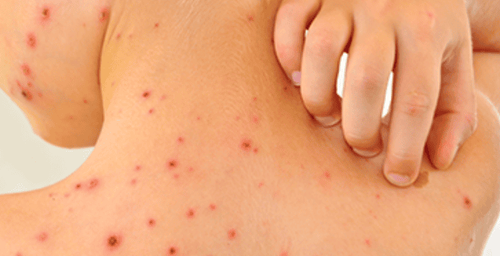Article reviewed by MSc. Dr. Nguyen Thi Nhat - Specialist in Infectious Diseases, Department of Internal Medicine & Outpatient Care, Vinmec Hai Phong International Hospital.
The early rainy season is when dengue fever spreads rapidly and can easily escalate into outbreaks. Patients with dengue fever may self-treat and rest at home. However, warning signs such as bleeding gums, vomiting blood, and passing black stools require immediate hospital visits, as they indicate severe dengue.
1. What is dengue fever?
Dengue fever is a highly common infectious disease in Vietnam, caused by the Dengue virus. There are four types of Dengue viruses: DEN-1, DEN-2, DEN-3, and DEN-4. The disease does not confer cross-immunity, meaning a person can contract dengue up to four times in their lifetime, with subsequent infections often being more severe due to the coexistence of antibodies for different Dengue virus types.
Dengue fever usually lasts 7–10 days and progresses in complex ways. Symptoms range from high fever, fatigue, and muscle pain to more severe signs like heavy vomiting, bleeding gums, blood in urine, and black stools.
2. Severe signs of dengue fever
Around 4–7 days after being bitten by a Dengue virus-carrying mosquito, patients may exhibit the following symptoms:
- Sudden high fever
- Fatigue, muscle and joint pain.
- Severe headache and pain in both eyes.

- Nausea, vomiting
- Red spots often appear on the third day of fever. To distinguish between rashes caused by bleeding and mosquito bites, stretch the skin around the rash with two fingers: mosquito bite rashes disappear when stretched but reappear after releasing, while rashes caused by bleeding remain visible.
By the third to seventh day, rashes spread across the body, and fever may persist or subside. Many people mistakenly think the disease is improving when the fever subsides, but this is the most dangerous phase. However, this is the most dangerous phase of the disease.
At this stage, patients need to pay attention to severe signs of the disease and see a doctor immediately if they have any signs as follows:
- Mucosal bleeding: Nosebleeds, bleeding gums, blood in urine, prolonged menstruation, or abnormal vaginal bleeding.
- Internal bleeding: Symptoms include heavy vomiting, vomiting blood, pain or discomfort in the liver area, passing black stools, agitation, cold hands and feet, and in severe cases, brain hemorrhage, which can be fatal if untreated.
- Plasma leakage: Increased vascular permeability may lead to concentrated blood, fluid accumulation in the chest or abdomen, shock, low blood pressure, and cardiovascular collapse.
When dengue fever causes bleeding gums as well as the above signs, patients need to immediately go to medical facilities for timely care and treatment.
3. How to prevent and treat dengue fever?

Treatment of dengue fever
There is no specific medication for dengue fever. Treatment focuses on managing symptoms and preventing complications. For mild cases, patients can rest and recover at home while strictly following medical advice:
- Rest, relax, and sleep under mosquito nets to prevent further infection.
- For high fevers over 39°C, loosen clothing, apply warm compresses, and take paracetamol for fever reduction. The standard dose is 10–15 mg/kg per dose, every 4–6 hours, with a maximum of 60 mg/kg in 24 hours. Avoid ibuprofen and aspirin as they increase the risk of bleeding.
- Eat soft, easily digestible foods such as porridge or soup. Drink plenty of fluids, including oral rehydration salts and fruit juices.
- Do not use antibiotics, as dengue is caused by a virus, and antibiotics are only effective against bacterial infections.
Dengue fever prevention
- Clear bushes, clean drains, eliminate stagnant water, and destroy mosquito larvae.
- Spray insecticide indoors and surrounding environment.
- Sleep under mosquito nets and use mosquito repellents or essential oils.
- Increase vitamin C intake to boost immunity, especially when in contact with infected individuals.
Both patients and caregivers should monitor for symptoms of dengue fever. If any signs are detected, seek medical care immediately for prompt treatment.
To arrange an appointment, please call HOTLINE or make your reservation directly HERE. You may also download the MyVinmec app to schedule appointments faster and manage your reservations more conveniently.










